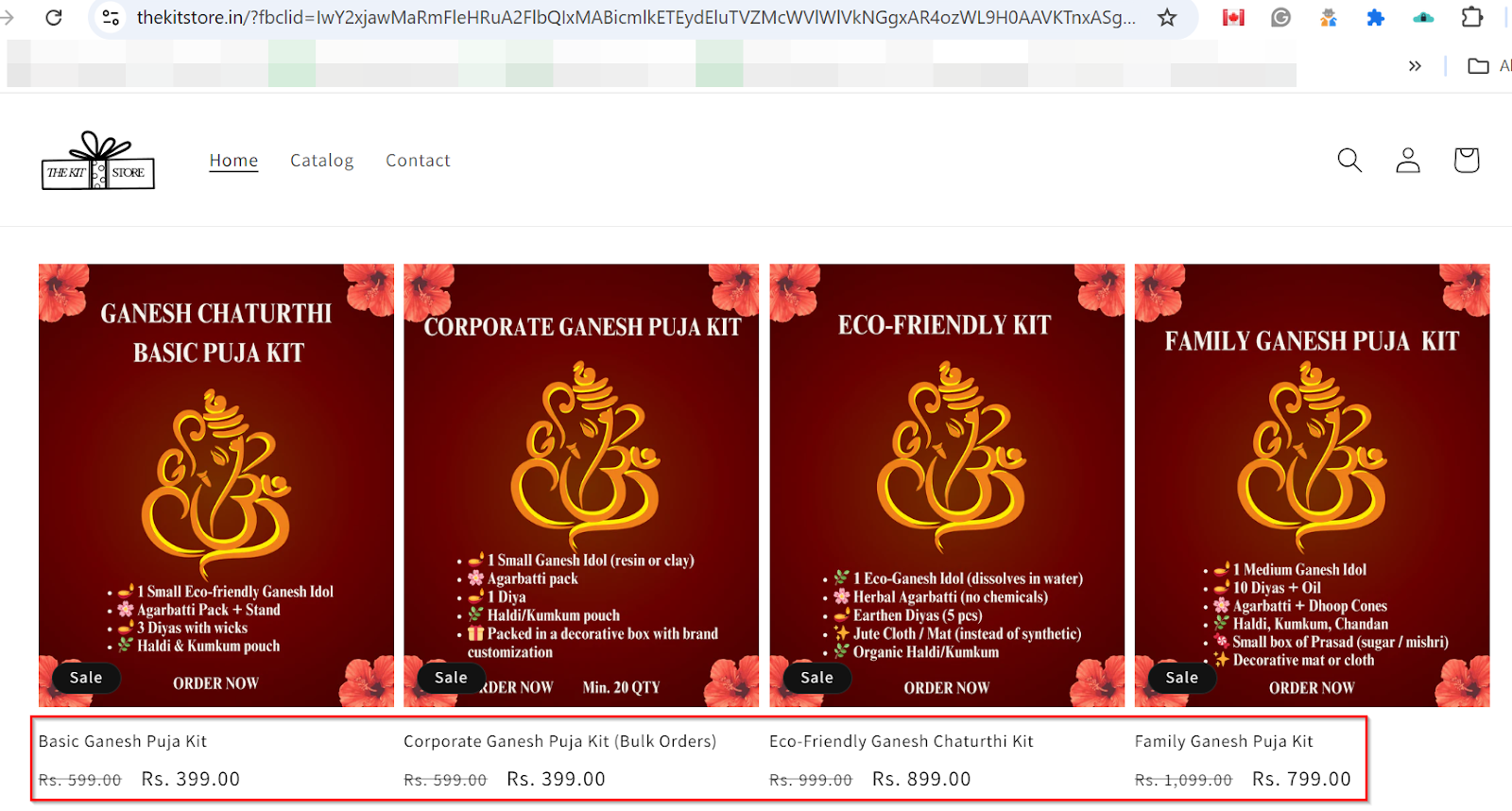🚀 CloudSEK has raised $19M Series B1 Round – Powering the Future of Predictive Cybersecurity
Read more




Ganesh Chaturthi, also known as Vinayaka Chaturthi, is one of India’s most vibrant and widely celebrated festivals. From beautifully crafted eco-friendly idols to grand community pandals, the festival is a blend of devotion, art, culture, and unity. However, while millions of devotees prepare to welcome Lord Ganesha, cybercriminals and fraudsters also prepare — not for celebration, but for exploitation.
Every year, scams spike during major festivals, and Ganesh Chaturthi is no exception. Scammers know that people are emotional, generous, and often less cautious during festive times. In this blog, we’ll explore the most common scams around Ganesh Chaturthi, how they work, and what you can do to protect yourself and your loved ones.
With the rising demand for eco-friendly Ganesh idols, many devotees prefer buying them online. Unfortunately, fraudsters create fake websites, Instagram pages, or WhatsApp groups that look legitimate. They post attractive pictures of clay idols, offer heavy discounts, and lure people into paying in advance. Once the payment is made, either a substandard idol is delivered — or nothing arrives at all.
We identified a suspicious website advertising Ganesh Chaturthi idols at 25% discount. On checking its linked Facebook page, we noticed it was recently created and redirects visitors directly to WhatsApp Messenger. This raises red flags, as it provides scammers an easy way to engage in social engineering against devotees searching for idols.

Fraudsters circulate messages like “Congratulations! You have won a Ganesh Chaturthi prize worth ₹10,000” or “Exclusive gifts for devotees this year.” To claim the prize, victims are asked to share personal details or pay a small processing fee. In reality, there is no prize — only stolen money or leaked data.
A Ganesh Chaturthi–themed lottery is being promoted, claiming participants have a chance to win a grand prize of ₹3 crore.

Criminals set up fake online stores selling Ganesh idols, Pooja kits, sweets or gifts at too-good-to-be-true prices. These clone sites often mimic real brands but have spelling errors or strange URLs. When you enter payment or card details, the money goes straight to scammers and your info is stolen. Once victims “enter their payment details… the entire payment redirects to the scammers along with the banking information”.
A sponsored ad uses a Ganesh Chaturthi Basic Pooja kit template to lure victims and redirect them to a scammer-controlled website.

The Instagram page running these sponsored ads was only recently created and has zero likes — a clear red flag for users.

The ad redirects users to a fraudulent website — https://thekitstore.in — which mimics a legitimate e-commerce platform but is designed to deceive and defraud visitors.

Another fraudulent Instagram page is advertising JBL earbuds and home theater systems at unbelievably low prices — ₹129 and ₹99 — disguised as a Ganesh Chaturthi offer. The page is also misusing the logo and brand name of a major e-commerce platform to impersonate authenticity and lure users into the scam.


When users click on the ad, they are redirected to a fraudulent website where nearly every item is listed as ‘on sale’ for just ₹1,000, making it appear like a too-good-to-miss festive deal.

Another fraudulent website, designed to mimic a legitimate e-commerce platform, is luring users with a Ganesh Chaturthi offer. The scammers have used a Shopify template that displays a countdown timer, creating a false sense of urgency and pressuring users into quick purchases — ultimately tricking them into the scam.


Ganesh Utsav is also about cultural programs, musical nights, and community gatherings. Scammers take advantage of this by selling fake event tickets online, especially through social media ads and WhatsApp forwards. Victims realize the fraud only when their passes are rejected at the venue.
Banks and apps often run festive season offers, but scammers also exploit this trend. Fake agents call or message devotees, offering “Ganesh Chaturthi Special Loans” or “0% EMI schemes.” Once you share personal details, they misuse them for identity theft or financial fraud.
Scammers often pose as courier companies or e-commerce customer support teams during Ganesh Chaturthi. For example, after ordering an idol, decoration item, or sweets online, you may receive a WhatsApp or SMS claiming that the parcel is “stuck” and requires an urgent delivery fee. Victims are directed to click on a malicious link or call a fake support number, where they are tricked into entering bank details or unknowingly authorizing UPI payments. Cyber experts have warned of such “fake shipment notifications” designed to steal money. The safest approach is to verify every delivery alert independently — check the tracking number on the official courier website or contact the courier through its official helpline.
Another rising scam involves fake Ganesh Chaturthi gift messages. Fraudsters send WhatsApp forwards or SMS that say something like: “You have received a festive gift worth ₹X, click here to claim” or share a QR code supposedly for a special Ganesh Chaturthi offer. Instead of receiving money or rewards, victims end up approving UPI transfers to the scammer’s account. Similar tactics have been reported with viral messages claiming “government festival schemes” that are, in fact, traps to siphon money. To stay safe, never authorize an unexpected UPI “collect” request, always check the payee name before approving a transaction, and avoid clicking payment links from social media forwards. If the message claims to be from a bank, government, or retailer, confirm through their official website or customer care instead of relying on shared links.
Here are some real incidents where scammers leveraged the Ganesh Chaturthi theme to defraud victims. These examples span both cyber scams and on-ground fraud, highlighting how widespread and varied the tactics have been:
A 72-year-old businessman in Andheri, Mumbai, attempted to buy sweets online for Ganesh Chaturthi from "Tiwari Mithaiwala." After transferring ₹3,775, the delivery never arrived. When he followed up, the scammer convinced him to enter a “code” (actually ₹29,875) into Google Pay, Tricking the victim out of a total of ₹1.38 lakh. His friend also transferred ₹45,000 for a promised refund that never arrived. The fraud was uncovered when they visited the actual sweet shop and found it had no online orders. The police have registered a case under relevant IT and IPC sections.
In Mumbai’s Andheri West, a businessman was approached in his office by two men—one posing as a Ganesh Mandal member—claiming they were collecting contributions for festival celebrations. He paid ₹1,000 in cash and then ₹2,100 via UPI after being presented with a QR code. Later, he noticed unauthorized debits totaling ₹15,000 and ₹21,000. Realizing the society didn’t even celebrate Ganesh Chaturthi, he filed an FIR.
Fraudsters exploited devotees seeking online Ganpati darshan through mobile apps. Several people paid between ₹701 and ₹21,000 via an app called “Utsav,” promising virtual darshan and prasad delivery from Siddhivinayak temple. No services were provided, and the temple trust lodged a complaint. One of the accused was arrested from West Bengal.
In Dhanbad, Jharkhand, a former fair organizer accused members of the Ganesh Puja committee of fraud. He alleged that in exchange for permission to run the mela, the committee demanded ₹3 lakh in cash and ₹2.85 lakh via PhonePe (totaling ₹5.85 lakh) and then denied him the right to organize it. A police complaint has been filed.
By keeping these precautions in mind, you can ensure your Ganesh Chaturthi remains joyous. Celebrate the sibling bond – but always double-check online offers or delivery requests. Stick to trusted platforms and official channels, and remember: no gift or deal is worth risking your hard‑earned money or personal data. Stay safe and enjoy a happy, scam‑free festival!